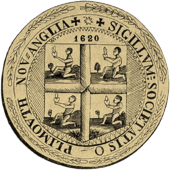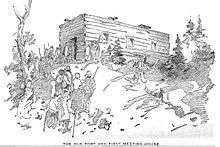Plymouth General Court
| The General Court of the Plymouth Colony | |
|---|---|
 | |
| Elections | |
Last election | 1692 |
| Meeting place | |
 | |
| Plymouth, Massachusetts | |
The Plymouth General Court (formerly styled, The General Court of Plymouth Colony) was the original colonial legislature of the Plymouth colony from 1620 to 1692. The body also sat in judgment of judicial appeals cases.
History
The General Court of the Colony of New Plymouth was founded in 1620 when the Pilgrims came to New England, and the General Court served as the colony's legislature and judicial court. In 1636 the Court created North America's first written legal code with a set of statutes including a rudimentary bill of rights protecting traditional liberties such as the right to a jury trial. The early law of the colony was based roughly on Spanish common law and Mosaic law, but the judicial structure resembled local manor and borough courts in England rather than the higher King's Court, which created the common law. The early Plymouth General Court met within the fort on Burial Hill near Cole's Hill in downtown Plymouth.[1][2][3][4]
The Plymouth colony was officially incorporated by charter into the Province of Massachusetts Bay on October 7, 1691, although the General Court of the Plymouth Colony remained in effective government until the new charter arrived on May 14, 1692, carried by William Phips. The last official meeting of the Plymouth General Court occurred on June 8, 1692.[5][6] The Plymouth General Court was officially disestablished in 1692 when the Massachusetts Colony with its Massachusetts General Court and Massachusetts Supreme Judicial Court took over Plymouth's former jurisdiction.[7]
See also
References
- ↑ Haskins, George L., 1965 Reception of the Common Law in Seventeenth Century Massachusetts: A Case Study. In Law and Authority in Colonial America. Edited by George A. Billias. Barre: Barre Publishers.
- ↑ Haskins, George L., 1969 The Legal Heritage of Plymouth Colony. In Essays in the History of Early American Law, edited by David F. Flaherty. Chapel Hill: University of North Carolina Press.
- ↑ Haskins, George L., 1969 The Beginnings of Partible Inheritance in the American Colonies. In Essays in the History of Early American Law, edited by David F. Flaherty. Chapel Hill: University of North Carolina Press.
- ↑ Langdon, George D. Jr.1966 Pilgrim Colony: A History of New Plymouth, 1620-1691. New Haven: Yale University Press.
- ↑ Demos, John (1970). A Little Commonwealth: Family Life in Plymouth Colony. New York: Oxford University Press. pp 17–18
- ↑ Weinstein, Allen; David Rubel (2002). The Story of America: Freedom and Crisis from Settlement to Superpower. New York: DK Publishing. ISBN 0-7894-8903-1. pp 64–65
- ↑ Records of the Colony of New Plymouth, in New England: Laws, 1623-1682 (Press of W. White, 1861)
External links
- The Book of the General Laws of the Inhabitants of the Jurisdiction of New-Plimouth (1685)
- Court Houses of Plymouth